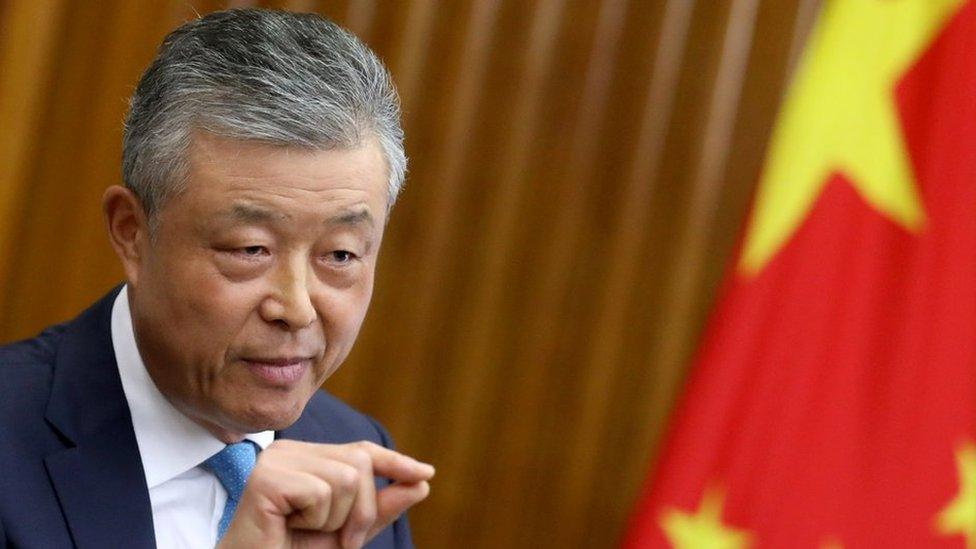UK and China relationship 'seriously poisoned', says Beijing's ambassador
- Published

Liu Xiaoming, China's ambassador to the UK, gave a press conference for over an hour on Thursday
The relationship between the UK and China has been "seriously poisoned", says Bejing's ambassador to London.
In a lengthy press conference, rebutting criticism of the Chinese government, Liu Xiaoming said the UK was at a "critical historical juncture" in its future with his country.
The ambassador urged the UK to "resist pressure" from the US to condemn China.
And he rejected accusations of human rights violations against Uighur Muslims in the Xinjiang region.
The UK and China have had a number of political disputes in recent months, including over the banning of technology firm Huawei from the UK's 5G mobile network and the new security law imposed in Hong Kong.
But Mr Liu said he hoped the governments had "enough wisdom and capabilities" to move forward from their differences "rather than allowing anti-China forces and Cold War warriors to kidnap the China-UK relationship".
A spokesman from the Foreign Office referred the BBC to earlier statements made by Foreign Secretary Dominic Raab, saying the UK government would "work to maintain positive, constructive engagement with the Chinese government".
But Mr Raab also stressed "the importance of China rebuilding trust with the international community by living up to its international responsibilities" and "upholding its international human rights obligations", adding: "The United Kingdom is watching. And the whole world is watching."
Labour's shadow foreign secretary Lisa Nandy said it was "important the UK continues to have a constructive relationship with China".
But, she said, it "cannot be at the expense of our values, whether it is standing up for the rights of people in Hong Kong or speaking up for the human rights of the Uyghur people".
Mr Liu's press conference, addressing divisions between the UK and China, lasted for over an hour, with him condemning "irresponsible remarks" of British ministers and the press for their coverage of his government.
He said China "respects UK sovereignty and has never interfered in the UK's internal affairs" and it was "important the UK will do the same," calling for the British government to "stop interfering in Hong Kong's affairs... so as to avoid further damage to the China-UK relationship".
Hong Kong security law: The BBC's Stephen McDonell explains what it means, and what people there think
The ambassador criticised the decision to ban Huawei from the UK's 5G mobile network, calling it a "dark day for UK and China relations, and an even darker day for the UK, with a missed opportunity to be a leading country in 5G infrastructure".
And he rejected claims of Chinese government involvement in the company, claiming it supported and promoted its home-grown businesses in the same way the UK government supports its own - pointing to the promotion of Rolls Royce and British Steel to China by previous British governments.
'Everyone is equal'
Mr Liu also said reports over China's treatment of Uighur Muslims - including accusations of forced sterilisation - were "lies cooked up by anti-China organisations" in the US, with "no factual grounds".
China's ambassador Liu Xiaoming: "There is no such concentration camp in Xinjiang"
The ambassador claimed a video he was confronted with on the BBC's Andrew Marr Show, appearing to show Uighurs being blindfolded and led to trains, instead showed "the transfer of a group of prisoners" and "has nothing to do with the so-called detainment of large numbers of Uighurs".
He added: "China's law does not target specific ethnic groups. Everyone is equal before the law".

What is China doing in Xinjiang?
Rights groups say up to a million Muslims have been detained in high-security prison camps across Xinjiang province.
Last year, the BBC saw leaked documents that showed 15,000 people from southern Xinjiang were sent to the camps in one week alone.
The same documents showed inmates can be released only when they "understand deeply the illegal, criminal and dangerous nature of their past activity".
The Chinese authorities say the Uighurs are being educated in "vocational training centres" in order to combat violent religious extremism.
However, evidence shows many are being detained for simply expressing their faith - for example, praying or wearing a veil - or for having overseas connections to places like Turkey.
The BBC visits the camps where China’s Muslims have their "thoughts transformed"
Uighurs, who are mostly Muslim, are ethnically Turkic and make up about 45% of Xinjiang's population.
Last month, a report by China scholar Adrian Zenz found China was forcing women in Xinjiang to be sterilised or fitted with contraceptive devices.
The report has prompted international calls for the United Nations to investigate.

Appearing to reference the US, Mr Liu said it was China's "hope that the UK would resist the pressure and coercion from a certain country and provide an open, fair, transparent and non-discriminatory environment for Chinese investment so as to bring back the confidence of Chinese businesses in the UK".
If the UK took this path, he said, there would be "unlimited prospects for China-UK co-operation" after Brexit and the end of the Covid-19 crisis.
"It is hard to imagine a global Britain that bypasses or excludes China," said Mr Liu.
"Decoupling from China means decoupling from opportunities, decoupling from growth and decoupling from the future."